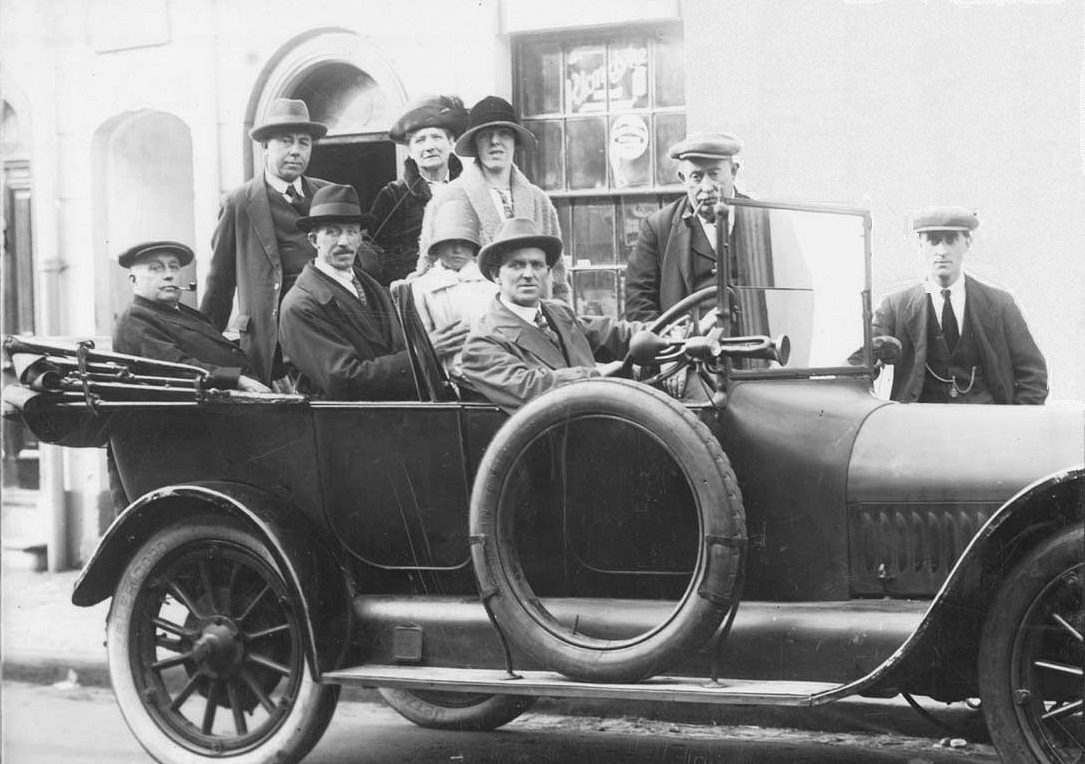William Braithwaite was born in Northallerton (the name of his later home at the corner of High Street and Murray Road in Preston), Yorkshire in 1853 and came to Australia on the “Royal Family” with his parents in 1863. His father William established a tannery in Murray Road in 1867 and William junior was trained in all aspects of the leather trade. H
His father was killed in an accident at the tannery in 1874 and William took charge of the business, gradually building it to become the largest employer in Preston.
Braithwaite established with others the first Preston Library in 1876, and along with another local business man, Mr. E. A. Walker (a nurseryman in Spring Street), he purchased the first lot of books for the new library.
He first entered the local council in 1885 and around the same time joined the Victorian Mounted Rifles volunteer corps. Finding the demands of the two organizations plus the responsibility of the day to day operation of the tannery somewhat extreme, he did not seek re-election after his first term as a councillor.
Braithwaite was appointed Captain in the Rifles in 1887 and promoted to Major in 1894, commanding the first battalion of the Victorian Mounted Rifles.
At the end of 1896, Braithwaite again stood as a candidate for the Shire Council and was elected, taking the chair in March of the following year following the resignation of Cr. Isaac Barrow. Amongst Braithwaite’s first tasks was the overseeing of the local celebrations for Queen Victoria’s Jubilee.
The outbreak of the Boer War in South Africa in 1900 saw Braithwaite, now second-in-command of the Victorian Mounted Rifles and in charge of a regiment keen to volunteer for active service, but at aged 47 and married with six children, the authorities perhaps wisely thought Braithwaite’s capabilities could be put to better use and he was appointed president of the Equipment Board supervising supplies dispatched to South Africa. Braithwaite also organized local volunteers, the first five Preston men to enlist being employees from his tannery.
Braithwaite’s services earned him special commendation. In 1908, Braithwaite was awarded the V. D. (Volunteers Decoration) for long service to the citizen’s forces movement and in 1911 was transferred to the retired list with the rank of honorary full Colonel. Locally he was the most vocal in a number of voices opposing a proposal for the Shire to seek a loan to establish a municipal abattoir and eventually at a public meeting convincing ratepayers to demand a poll on the issue which saw the proposal overwhelmingly defeated.
Braithwaite resigned from the Shire Council in 1909 to take an extended holiday in the “Old World” but in response to public demands re-entered the chambers in 1911.
Braithwaite was elected President of Preston-shire on September 2 1913 and still held the position at the outbreak of war (although he was holidaying in Europe at the time).
His only son – there were five daughters in the family – William McCarthy Braithwaite was killed in action at St. Quentin in France on October 3, 1918, just three weeks before the cessation of hostilities. Braithwaite junior embarked for the front early in 1916 and was awarded a Military Cross for conspicuous gallantry at Bullecourt in 1917.
Braithwaite senior in 1919 donated bonds to the value of £1500 in the Melbourne & Metropolitan Board of Works to the Melbourne Grammar School to be used for scholarships to commemorate his son’s name, “preference to be given to sons of those serving in the A.I.F”.
Colonel Braithwaite died of bronchial pneumonia in a nursing home at the Portland Place Hospital in London on August 5, 1922 while on a trip with his wife, Louisa, to visit the grave of their son at the 234 Prospect Hill Cemetery, Gouy in France. Braithwaite himself had previously visited the grave in 1920, but his wife was too distressed at the time to make the arduous trip. For a man who spent more than thirty years in the volunteer services, it was perhaps ironic that he passed away on August 5, the anniversary of the Empire’s declaration of the First World War.
His body was freighted back to Australia on the “Diogenes” and a memorial service scheduled for St. Paul’s Cathedral on September 27. Delays en route pushed the proposes date of the service back on October 2, and even then the surviving members of his family got a fright when the coffin could not be found when the ship arrived early the previous day. After an extensive search, it was finally located under a large pile of ropes in one of the holds.
William Braithwaite was finally laid to rest in Coburg Cemetery. He was 69 years of age and left his widow Louisa, who sadly did not arrive back in Australia eight days after her husband was laid to rest and five daughters. Although there is no surviving documentation, it is believed a service for Braithwaite was held in England prior to his remains being loaded for return to Australia.
About the image : William Braithwaite took a keen interest in new invention of the time. the motor car, competing along with another local, the nurseryman James Railton in the reliability trial to Sydney in January, 1914.
The image shows Braithwaite, (wearing cap at rear) with extended family and motor car, a 30 h.p. Hotchkiss imported from France, circa 1911. Rather surprisingly for a man that had such a hand in shaping the future of Preston, there are no other surviving images in the public domain of Braithwaite.
His son William and a son-in-law later established a hire car service that ultimately developed into today’s Preston Motors.
Preston Leader, 24 March, 1900
The Argus, 24 April, 1900
The Argus, 28 January, 1901
“”A Far-Famed Name : Braithwaite of Preston”, Winty Calder, 1990 (available at Darebin Libraries)
The Leader,12 August, 1922 (full obituary)
“Darebin’s Boer War”, Brian Membrey, Darebin Heritage
